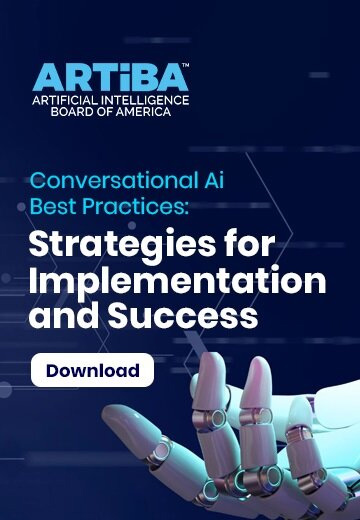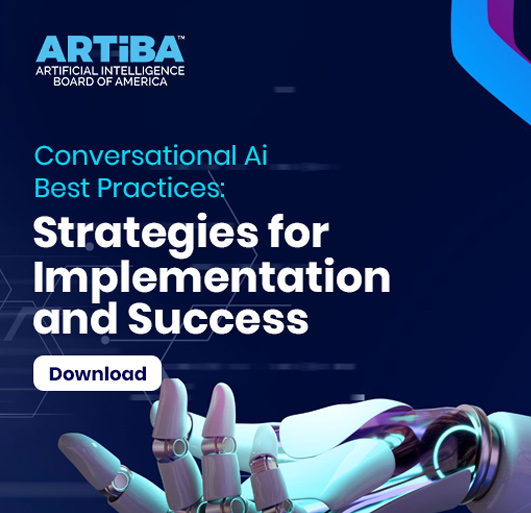AI Strategies: Using NLP, ML, and DL for Businesses

Recent developments in Artificial Intelligence (AI), in particular, deep learning and machine learning have been significantly improving business performance and ROI. Most of the AI projects focus on AI models. ARTiBA discusses how machine learning, deep learning, and natural language processing are used in developing AI strategies here.
Artificial Intelligence has been around for decades now. But the talks around AI have increased with the constant surge in data, and the invention of AI applications to decipher it to solve business problems. The massive datasets, computing power, improvised algorithms, open-source code libraries, and frameworks have made today’s businesses apply AI for business improvement and profit. The use of AI is important in business for the following reasons.
Importance of Artificial Intelligence
-
AI can perform high-volume, repetitive, and computerized tasks without fatigue. Thus, it eases the manual and repetitive tasks of professionals.
-
It adds intelligence to technology products such as bots, smart machines, and conversational platforms.
-
AI can analyze more and granular data by using deep neural networks and achieve incredible accuracy. For instance, Alexa and Google Photos get more accurate as we keep using them.
-
AI adapts quickly and efficiently through progressive learning algorithms, and the data itself can become intellectual property.
Basic components of AI
A judicious approach to Artificial Intelligence makes your data simple and accessible. To create basics for business-ready data analytics, following a coherent step-by-step plan is highly essential. This helps to roll out AI across the departments in an organization and its governance. Take a look at the basic components or core building blocks of AI here:
AI Applications: Needed to solve a business problem
Data preparation: Prepare and clean your data for AI
Data studio: It refers to the studio of data science where scientists build, train, and run ML models
Essential features: Speech, text, images, and vision for consumer user cases
Natural language processing: It is essential as it forms the nervous system of an enterprise AI
Life cycle management: It is needed to understand and manage the lifecycle of AI models
Moving forward, let’s understand how Artificial Intelligence applies machine learning, deep learning, and natural language processing to solve business problems.
AI strategies: Using ML for businesses
Machine learning is an application of AI or a sub-set of AIs. It enables the AI systemto learn from the environment automatically and apply those learnings to make better decisions. Machine Learning (ML) allows the system to take decisions using historical data – both structured and unstructured, without being explicitly programmed.
It works on algorithms for specific domains. The algorithms use statistical techniques to spot patterns and perform actions. For instance, if you create a machine learning model to detect pictures of lions, it will respond only to that. It will not respond when new data – say, pictures of tigers – is provided.

The performance of AI with Machine learning is extremely high in pattern recognition, image analysis, content generation, speech transcription, and language translation. As a result, the practical applications of ML are increasing across industry verticals such as finance, insurance, retail, e-commerce, healthcare, and logistics.
AI strategies: Using deep learning for businesses
Deep learning (or neural learning or deep neural networks) is a subset of ML that operates in a non-linear decision-making process. The decisions are made on unstructured data without supervision (independent of humans). Being inspired by the biological neural network of the human brain, it is capable of analyzing data with a logical structure similar to the human brain in drawing conclusions.
It uses hierarchical neural networks while analyzing data that allows it to take a nonlinear approach. Processing of data across the layers will integrate as a subsequent tier of additional information. It will not store all data in a huge pool, but remember associations between concepts, and thus streamline the process of retrieval and analysis.

Deep learning in AI
When detecting fraud, deep learning leverages signals such as credit score, retailer, sender, and IP address.It analyzes the sent amount (first layer) and then includes the IP address (in its next layer), and in the third layer, the credit score will be added to the existing information.In brief, it arranges ideas as layers of definitions to make a final decision.
Deep learning is currently used to improve customer experience and satisfaction;generate text by using grammar and style of a piece of text; detect objects from satellites; improve worker safety in factories and warehouses; add color to videos and photos in black-and-white; detect cancer cells; and computer vision.
AI strategies: Using NLP for businesses
Natural language processing (NLP) describes the ability of a computer to process and understand language in its written, spoken, or digital form.

Natural language processing starts with access to data in its original form, i.e., a written message in the database, and a language base to compare. The data is then broken down using preprocessing techniques such as breaking words into basic forms (tokenization), removal of stop words, converting a word to its meaningful form (lemmatization), and determining what part of the sentence (part-of-speech tagging).
Then, the data is analyzed using AI techniques to deduce meaning for the stated use case. Though the technology tool helps, it is recommended that humans should play a role in determining the result given by NLP.
For instance, Google Assistant, Apple’s Siri, and Amazon’s Alexa use NLP.
Further, NLP in business analytics allows users to search for information using common phrases than a word that search engine or business intelligence will understand.
Working together with Artificial Intelligence
Artificial Intelligence augments the abilities of AI professionals and makes us better at what we do. It observes patterns and relationships that we might tend to ignore. AI is not here to replace our tasks, and learning AI offers us several opportunities to improve businesses.
Artificial Intelligence helps industries to incorporate analytics; improves business performance; breaks down economic barriers; and augments our existing abilities.
Conclusion
As organizations progress in their AI journey, incorporating all of these AI strategies into businesses will become more pronounced.
As an AI professional, it is high time to hone your skills to excel in your career in Artificial Intelligence. To learn more about Artificial Intelligence, earning the most-coveted Artificial Intelligence Engineer (AIE™) certification can help you. This program covers the comprehensive curriculum designed by ARTiBA to build job-ready AI skills. It enables you to carve a niche in your AI career at a faster rate.









